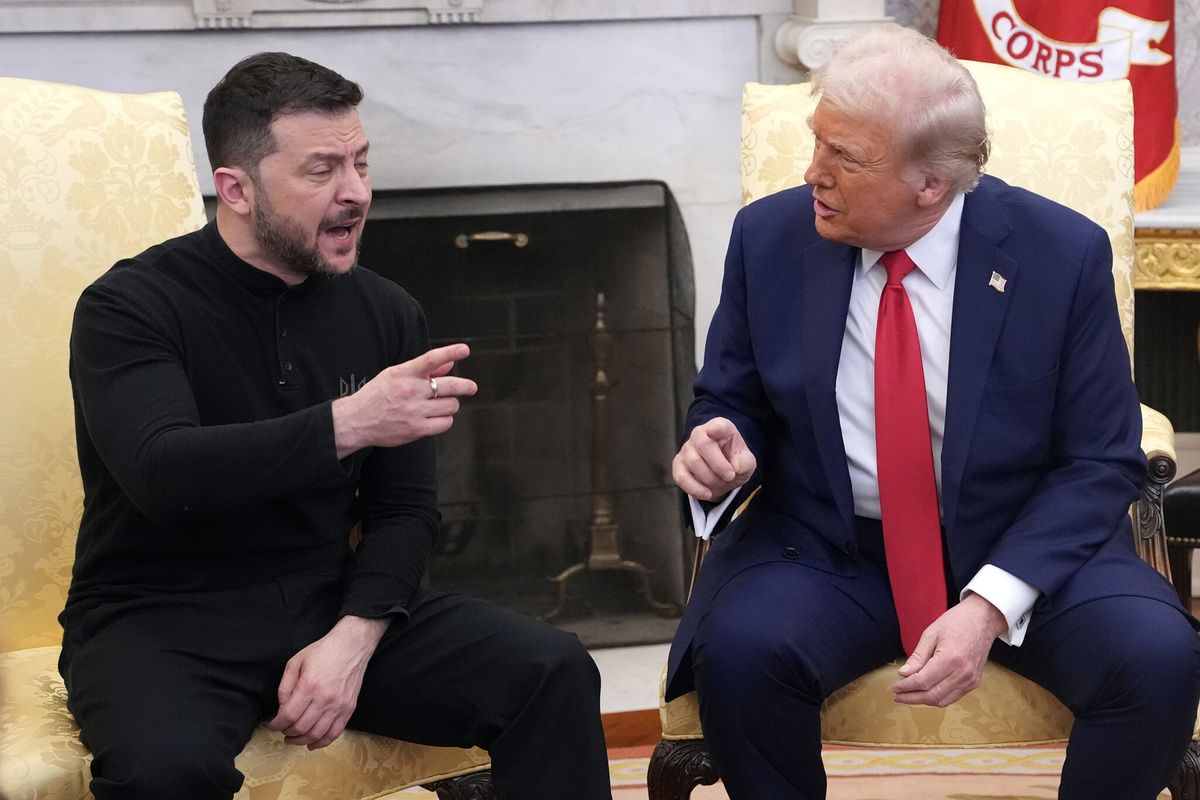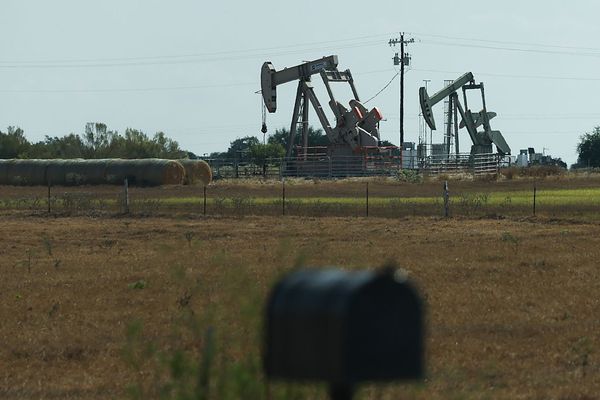Secretary of State nominee Rex Tillerson on Wednesday sharply differed from President-elect Donald Trump on a number of key foreign policy issues, suggesting he’d take a much tougher line on Russia while at the same time declining to make any pledges regarding sanctions in response to Russian interference in the U.S. election.
During his confirmation hearing before the Senate Foreign Relations Committee, Tillerson, the former ExxonMobil CEO, also made statements at odds with the president-elect on nuclear issues, a ban on Muslims, NATO, the Iran deal and climate change. Tillerson told senators he has only spoken with Trump about world issues in broad terms and that they have not spoken in-depth on Russia policy.
"I would have thought Russia would be at the very top of that, considering all of the actions that have taken place. Did that not happen?" New Jersey Democrat Sen. Bob Menendez asked.
“That has not occurred yet,” Tillerson said.
The nominee faced questioning about his years atop ExxonMobil, most notably on the company’s lobbying of Congress on sanctions. Tillerson, who had opposed sanctions during his long career at ExxonMobil, said he had not personally lobbied against sanctions and that to his knowledge, he was not aware of ExxonMobil directly doing so. He later said the company "participated in understanding how the sanctions are going to be constructed."
Tillerson told senators he would take a much stronger line on Russian aggression than that advocated so far by the president-elect. He called Russia a “danger” and said that NATO’s mutual defense guarantee, Article V, is inviolable — something Trump called into question during his campaign.
Candidate Trump said the U.S. would only defend NATO countries, which may feel threatened by Russia, if they had “fulfilled their obligations to us” and that he would “be looking at” recognizing Crimea as a part of Russia and lifting sanctions imposed after the 2014 annexation.
Perry Cammack, who was part of Secretary of State John Kerry’s policy planning staff from 2013 to 2015 and previously worked on the Senate Foreign Relations Committee for nearly a decade, said overall, Tillerson acquitted himself “well” during the hearing and was “fairly candid in a lot of cases.”
“We’re at one of the most remarkable moments in American political history with the Trump transition, but you would not know that just watching the hearing. I was struck by how little there were signs of 'Trumpism.' Tillerson was quite effective and pretty impressive in his answers and really reflected a traditional Republican conservative view,” Cammack, now a fellow in the Middle East Program at the Carnegie Endowment for International Peace, said.
Tillerson on Wednesday discussed sanctions as a potential tool of foreign policy and said he supports maintaining current sanctions against Russia for now.
“I would recommend maintaining the status quo until we are able to engage with Russia and understand better what their intentions are,” he said.
He noted that sanctions can disrupt U.S. business overseas and spoke of his opposition to them as ExxonMobil CEO, while also calling them a “powerful tool, and they are an important tool in terms of deterring additional action.” But, he said, “designing poor sanctions and having poor and ineffective sanctions can have a worse effect than having no sanctions at all if they convey a weak response.”
From a “philosophical perspective, I thought he was being pretty candid in sharing his own view” on the pros and cons of sanctions, Cammack said. It was “an honest exchange,” he added.
During the hearing, Senator Marco Rubio (R-FL) pressed the secretary of state nominee on if he believed the current executive orders related to cybersecurity and Russian interference should be repealed by the incoming president.
“I would want to examine it and all aspects of it when in consultation, not only with the president, but with other inner-agencies that are going to have input on this as to their views,” Tillerson said.
Tillerson would not commit to supporting a bipartisan sanctions bill that would codify into law sanctions recently imposed by the Obama administration in response to Russian interference in the U.S. election. Writing the sanctions into law “leaves the executive branch no latitudes or flexibility in dealing with the broad array of cyber threats,” Tillerson said.
“I think it is important that those be dealt with on a country by country basis, taking all other elements into consideration … so getting the executive the tool is one thing, requiring the executive to use it without any other considerations, I would have concerns about,” Tillerson said.
Deputy Secretary of State Antony Blinken said that although he did not want to comment on the hearing, he wanted to note “we’re working very closely with the incoming administration to make this the smoothest, most effective transition possible. We very much look forward to continuing to support his efforts to get underway, assuming he’s confirmed, and to support that effort in any way we can.”
Blinken, who said he has had “some engagements” with Tillerson, said the “front-burner challenge” for the next secretary of state will be the “fight against Daesh and defeating Daesh militarily.” Another critical area will be North Korea and “making sure that the building blocks of this sustained comprehensive pressure strategy not only remain in place but are built upon.”
“All of that is a big diplomatic lift and that’s really, very, very significant,” he said.
Tillerson, meanwhile, said that he would have supported a much more vigorous response to Moscow’s 2014 annexation of Crimea.
“I would have recommended that the Ukraine take all of its military assets it had available, put them on that eastern border, provide those assets with defensive weapons that are necessary just to defend themselves, announce that the U.S. is going to provide them intelligence and that either NATO or U.S. will provide air surveillance over the border to monitor any movements,” he said.
A number of senators pressed Tillerson on his views on Russia and President Vladimir Putin. As the head of America’s largest oil company, Tillerson has done deals with Putin, and in 2012, the Russian president personally bestowed Russia's Order of Friendship on Tillerson for his work.
Tillerson noted that he had not seen classified information related to Russian interference in the U.S. election, but said it was a "fair assumption" Putin would have known about it and authorized it, based upon his own understanding and experience of Russia.
Rubio zeroed in on Russian military actions in support of Syrian President Bashar al-Assad during a heated exchange, asking Tillerson, “Is Vladimir Putin a war criminal?”
“I would not use that term,” Tillerson replied.
According to Cammack, a striking aspect of Wednesday’s confirmation hearing was that “given you’ve got a new president coming in a week’s time, it doesn’t seem to me Trump’s views on foreign policy are carrying much weight with his Republican caucus.”
“Most of the questions were Russia, Russia, Russia — there’s a lot of daylight between where the president-elect is and many Republicans,” he said. “It suggests they’re not going to be necessarily beholden to him on foreign policy issues, compared to say, when Bush or Obama came it, it’s clear. It struck me that Republican members either see a need to differentiate themselves from Trump on foreign policy, or certainly feel unafraid of doing so.”
Tillerson frequently dodged questions on policy throughout the hearing, telling senators that he would need more time or classified briefings to study various issues, such as Russian offenses in Syria or Philippines President Rodrigo Duterte’s violent “war on drugs.”
Cammack noted that nominees “are coached religiously to not give senators a rope to hang them on.”
Every nomination hearing “involves some evasion, but for the most part I thought he was pretty frank in his answers. I was struck by how mainstream his views, particularly in comparison with Trump,” Cammack added.
“But given that M.O. going in, he was fairly candid in a lot of cases and that was kind of refreshing,” he said, pointing particularly to the moment where Tillerson broke with Trump and said he did not oppose the Trans-Pacific Partnership trade agreement.
The question, if Tillerson becomes Secretary of State, will be “how much influence is he going to have?” Cammack asked.
“Some may be reassured by Tillerson based on this, but how much does it actually matter?” he said.
There has also been no choice made on a deputy secretary of state, Cammack pointed out, “and until you have a deputy announcement, none of the other pieces fall into place.”
“Ten days from inauguration, there’s no deputy and not even a name — that’s a little bit worrisome,” Cammack said. “Tillerson, as the CEO of an organization on the same order of magnitude as State, will probably be a pretty competent manager and instinctively know how to utilize the human capital he has, but if you don’t have a deputy, it’s hard to then make nominations for under secretaries or assistant secretaries.”
“There’s a real short-term concern over the next six months or so — they need to get people in place and confirmed. And if not, it’s going to hamper Tillerson’s ability to function as well as he might otherwise,” according to Cammack.
Mackenzie Weinger is a national security reporter at The Cipher Brief. Follow her on Twitter @mweinger.
Leone Lakhani contributed to this report.











